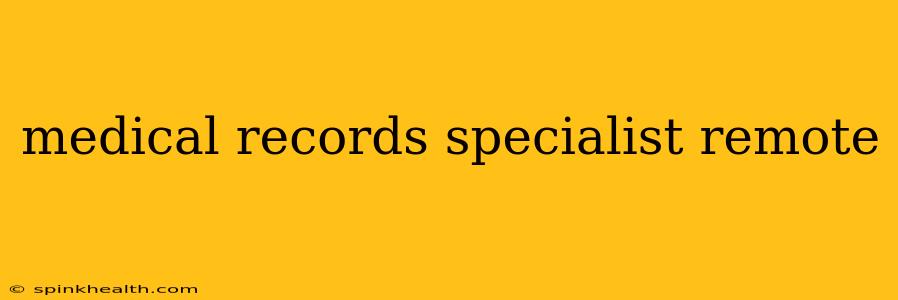The world of healthcare is evolving, and with it, the opportunities for skilled professionals. If you're seeking a career that blends medical expertise with the flexibility of remote work, then becoming a remote medical records specialist might be the perfect fit. This isn't just about clicking buttons; it's about safeguarding sensitive information, ensuring patient privacy, and playing a vital role in the smooth functioning of healthcare facilities. Let's dive into the world of remote medical records specialization.
What Does a Remote Medical Records Specialist Do?
Imagine this: You're working from the comfort of your home office, diligently organizing and maintaining patient health information. That's the essence of a remote medical records specialist's role. Your day-to-day tasks might involve:
- Charting and documentation: Ensuring medical records are accurate, complete, and up-to-date. This often involves inputting data from various sources, including doctor's notes, lab results, and imaging reports.
- Data entry and management: Maintaining a meticulous database of patient information, adhering strictly to HIPAA compliance regulations. This requires precision, accuracy, and a keen eye for detail.
- Record retrieval and release: Processing requests for medical records from patients, insurance companies, or other healthcare providers. This demands a deep understanding of release-of-information protocols.
- Coding and classification: Applying appropriate medical codes (like ICD-10 and CPT) to ensure accurate billing and data analysis.
- Quality control: Regularly reviewing records for accuracy, completeness, and compliance with regulations.
The work demands focus and precision, but the flexibility of remote work makes it a compelling career choice for many.
What Skills are Essential for a Remote Medical Records Specialist?
This isn't just about typing fast; it's a multifaceted role that requires a blend of technical and soft skills.
- Medical terminology and coding: A strong grasp of medical terminology, ICD-10, and CPT coding is crucial. These are the languages of healthcare, and fluency is essential.
- Data entry proficiency: Accuracy and speed are key. You'll be handling sensitive information, and errors are unacceptable.
- Electronic Health Record (EHR) Systems: Familiarity with various EHR systems (Epic, Cerner, etc.) is highly beneficial. Many facilities use specific software, so adaptability is a must.
- HIPAA compliance: Strict adherence to HIPAA regulations regarding patient privacy and data security is paramount.
- Excellent organizational and time management skills: You'll be juggling multiple tasks, so organization and time management are vital for success in a remote environment.
- Strong communication skills: Clear and professional communication with colleagues and external parties is essential.
What are the Educational Requirements?
While specific requirements vary depending on the employer, many remote medical records specialist positions prefer candidates with:
- Associate's or Bachelor's degree in health information management (HIM) or a related field. This provides a solid foundation in medical terminology, coding, and healthcare regulations.
- Relevant certifications: Certifications like the Registered Health Information Technician (RHIT) or Registered Health Information Administrator (RHIA) demonstrate competence and commitment to the profession. These credentials greatly enhance your job prospects.
However, some employers may consider candidates with relevant experience in lieu of formal education.
What is the Salary Range for a Remote Medical Records Specialist?
The salary for a remote medical records specialist varies depending on factors such as experience, location, and employer. However, you can expect a competitive salary reflecting the importance of this role in maintaining patient care and data security.
How Can I Find Remote Medical Records Specialist Jobs?
The job hunt may involve utilizing online job boards, networking within the healthcare industry, and directly contacting healthcare facilities offering remote positions. Remember to highlight your skills and experience in your resume and cover letter, emphasizing your knowledge of relevant software and compliance regulations.
Is there a difference between a Medical Records Clerk and a Medical Records Specialist?
Yes, there is a difference. A medical records clerk usually handles more basic tasks, such as filing and retrieving paper or digital files. A medical records specialist typically possesses more advanced knowledge, handles more complex tasks like coding and abstracting, and requires a higher level of training or certification.
What are the career advancement opportunities for a remote medical records specialist?
Experienced medical records specialists can often progress into supervisory roles, such as team lead or manager. With continued education and training, they might also pursue roles with increased responsibility, such as quality assurance specialist or compliance officer.
This journey into the world of remote medical records specialization requires dedication and skill, but the rewards—both personal and professional—are substantial. With a blend of expertise, adaptability, and a commitment to patient care, you can chart a successful course in this exciting and in-demand field.

